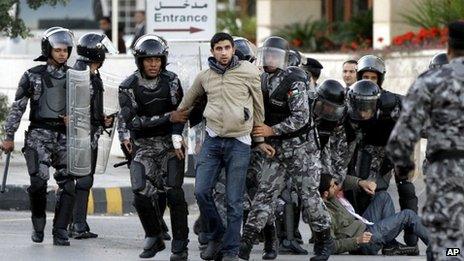Jordan police kill 'gunman' amid fuel price unrest
- Published

Jordanian police say they have shot dead a gunman attacking a police station in the north of the country on the second day of countrywide unrest.
At least 12 officers were wounded in the attack near the city in Irbid province, according to police.
Rioting and protests were reported in several Jordanian cities on Wednesday.
The unrest was sparked by the announcement on Tuesday night of increases in fuel prices, following the lifting of government subsidies.
In a second attack on a police station near the capital Amman, a police officer was shot in the eye, according to a police statement.
Several hundred protesters gathered in Amman and were dispersed by police using tear gas.
Protesters have called for the resignation of Prime Minister Abdullah Ensour, and some have openly criticised King Abdullah, a taboo punishable by prison.
"I like the king, but so what?" 29-year-old civil servant Daoud Shorfat, one of the protesters in central Amman on Wednesday, told the Associated Press.
"He can't feel our pain. He is watching the government raising the prices, while the people are barely able to feed their hungry children."
In the city of Salt, near Amman, protesters were prevented from reaching Mr Ensour's house.
Unrest was also reported in several locations across the country, including the cities of Karak, Irbid and Maan.
Economic woes
Ministers say the decision on fuel subsidies was necessary to tackle a budget deficit of 3.5bn dinars ($5bn; £3.1bn).
Household cooking gas has gone up by just over 50%, diesel and kerosene by 33% and lower-grade gasoline by 15%.
Mr Ensour told state TV on Tuesday that the price rises would be offset by government payments to low-income families.
Jordan is normally a heavy importer of Egyptian natural gas, but over the past year the pipeline which supplies gas to both Israel and Jordan has been attacked several times, forcing the country to use more expensive supplies.
Last month about 10,000 people took part in a protest in Amman called by the Muslim Brotherhood's political wing, the Islamic Action Front, demanding broader political representation and a more democratic parliament.
King Abdullah has called early elections for 23 January. The opposition has threatened to boycott the poll.
Jordan has so far avoided the large-scale unrest and political upheaval that rocked much of the Arab world last year and led to changes of leadership in Egypt, Libya, Yemen and Tunisia.
- Published28 October 2012
- Published5 October 2012
- Published19 April 2023